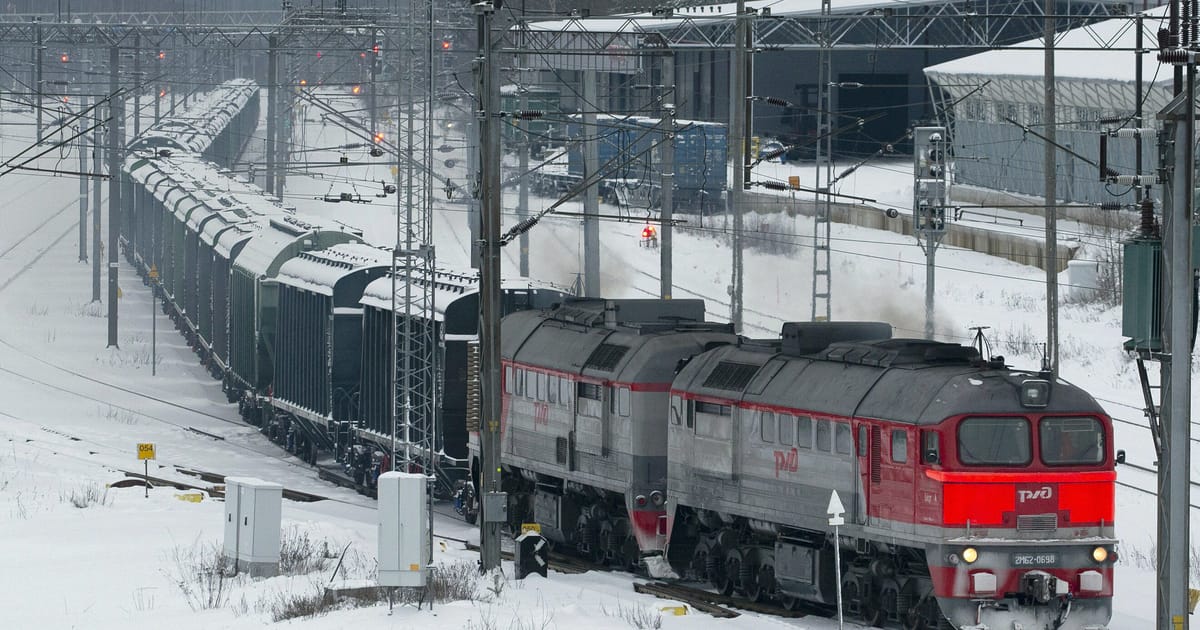Ukraine’s security service blew up a railway connection linking Russia to China, in a clandestine strike carried out deep into enemy territory, with pro-Kremlin media reporting that investigators have opened a criminal case into a “terrorist attack.”
The SBU set off several explosions inside the Severomuysky tunnel of the Baikal-Amur highway in Buryatia, located some 6,000 kilometers east of Ukraine, a senior Ukrainian official with direct knowledge of the operation told POLITICO.
“This is the only serious railway connection between the Russian Federation and China. And currently, this route, which Russia uses, including for military supplies, is paralyzed,” the official said.
Four explosive devices went off while a cargo train was moving inside the tunnel. “Now the (Russian) Federal Security Service is working on the spot, the railway workers are unsuccessfully trying to minimize the consequences of the SBU special operation,” the Ukrainian official added.
Ukraine’s security service has not publicly confirmed the attack. Russia has also so far not confirmed the sabotage.
OP missed the fun bit after the tunnel bombing:
The first cargo train exploded directly in the Severomuysky tunnel.
To continue transportation, the Russians began to use the detour route through the so-called Devil’s Bridge — a 35-meter high viaduct structure, which is part of the Trans-Siberian Railway. At that point, SBU saboteurs struck again.
“When the train was passing over this 35-meter high bridge, the explosive devices embedded in it went off,” the same official added.
Thanks for the details
Just to add, according to Denys Davidov’s report on ukraine, the first train was carrying jet fuel, which added to the whole explosion.
Jet fuel can’t blow up steel beams! Wake up sheeple!
Jet fuel can’t blow up steel beams! Wake up sheeple!
Wasn’t that the reason though that the Twin Towers in NY fell, because the jet fuel melted the steel beams infrastructure?
I had read/seen that the buildings were actually designed to handle a plane crashing into them, but the architects didn’t expect the metal beams to melt from the high-temperature burning jet fuel.
My understanding is that the beams were sprayed with a fire retardant foam that is designed to protect it in the event of a typical building fire. But the violent impact of the jets would have stripped most of it off, and the jet fuel did indeed weaken the beams. They wouldn’t have melted outright, but softening them after already being damaged by the impact was more than it could handle.
That’s my understanding as well.
And that the fire retardant foam was designed to be hit by an airplane and stay on, but it was just designed in those days for a smaller 737 impact, and not for a heavybody plane, so it got knocked off, exposing the beams.
Edit: Lol, ok, meant beams, not beans.
It’s a conspiracy theory, and not a particularly intelligent one. Us normies like to make jokes like this mocking people who believe it, but they do actually believe it and will come up with some batshit insane logic to support their theories.
I haven’t heard of anything to refute that, and have heard things to confirm that.
If you have any info you’d like to submit, please do so.
Edit: By refute that, I mean refuting that the jet fuel burning caused the metal to weaken onto collapse.
The internet since 2001…? There’s reams of examples of people who believe this crap and have posted it. I wouldn’t be surprised if people have done PhDs where this conspiracy theory is featured heavily.
Just to make sure we are on the same page, are you saying that the jet fuel burning the metal beams of the building is true, or a conspiracy?
If you have any info you’d like to submit, please do so.
Well, here’s what 5 minutes of research yielded
For example, according to www.911research.wtc7.net, steel melts at a temperature of 2,777 degrees Fahrenheit, but jet fuel burns at only 1,517 degrees F. No melted steel, no collapsed towers.
https://www.scientificamerican.com/article/fahrenheit-2777/
All materials weaken with increasing temperature and steel is no exception. Strength loss for steel is generally accepted to begin at about 300°C and increases rapidly after 400°C. By 550°C steel retains approximately 60% of its room temperature yield strength, and 45% of its stiffness.
Jet fuel burns at 1500f, which is 815c. At 800c steel retains less than 20% of the strength that it has at room temperature. There you go, fully debunked with minimal effort and extremely basic facts.
Well, here’s what 5 minutes of research yielded
The problem is, I read contradictory information, so both sides say they’re correct…
For example, this…
FACT: Jet fuel burns at 800 to 1500 degrees Fahrenheit, not hot enough to melt steel (2750 degrees Fahrenheit). However, experts agree that for the towers to collapse, their steel frames didn’t need to melt, they just had to lose some of their structural strength—and that required exposure to much less heat.
Melted beams or not, the WTCs design is what made it collapse like a peeling banana. The floors were essentially cantilevered out and held in place with a load bearing facade (for an open floor concept) There wasn’t much holding the floors onto the facade, once the weight of the floors began to sag down it essentially started to lever and pull the beams of the central core apart from all sides like a banana peel.
I don’t think those buildings were built to withstand an airplane, at least not the one they were hit by. In hindsight that open floor concept may actually have been a stupid idea, at least the way it was executed.
I don’t think those buildings were built to withstand an airplane, at least not the one they were hit by.
From what I saw on a show that covered that a long time ago, they were, but not for the larger planes that we have today, but the ones that flew back in the 70’s.
It must be very hard for Russia to detect Ukrainians that work under cover in Russia, this must be a major vulnerability for Russia. Unfortunately the same is probably true the other way.
Probably not so much the other way, most Ukrainians are fluent in Russian, I doubt many Russians are fluent in Ukranian
Yes that’s exactly what I meant, the similarity of the languages, but I didn’t know whether that is equal both ways. I sincerely hope you are right, that it’s more difficult for the Russians.
I noticed this in the beginning of the war, that it would be relatively easy for Ukraine to perform sabotage in Russia. I’m kind of surprised it’s not more wide spread?It’s quite easy to understand each other for both parties, but Ukrainians actually learn the Russian language in school, so they can speak good Russian. Russians can’t speak good Ukrainian as they don’t learn it. And speaking is very important for sabotage operations.





